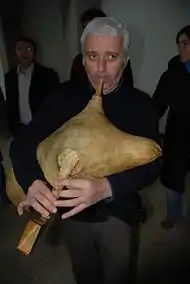Tulum (bagpipe)
The tulum (or guda (გუდა) in Laz) is a musical instrument, a form of bagpipe from the Laz region of Turkey. It is droneless with two parallel chanters, and is usually played by the Laz and Hemshin peoples and by Pontic Greeks, particularly Chaldians. It is a prominent instrument in the music of Pazar, Hemşin, Çamlıhemşin, Ardeşen, Fındıklı, Arhavi, Hopa, some other districts of Artvin and in the villages of the Tatos range (the watershed between the provinces of Rize and Trabzon) of İspir. It is the characteristic instrument of the transhumant population of the northeastern provinces of Anatolia and, like the kemençe in its area, the tulum imposes its style on all the dance and entertainment music of those for whom it is "our music".[1]
 | |
| Classification | |
|---|---|
| Related instruments | |
| |

Terminology
Some of the names of bagpipes from the Near East include:
- Guda (Laz)
- Gudast'vri, გუდასტვირი (Georgian)
- Ç'ip'oni (Artvin, Adjara, Lazona)
- Dankio (Pontic Greek, Romeika)
- Parkapzuk, Պարկապզուկ (Armenian)
- Shuvyr (Mari people), North Circassians)
- Sahbr, Shapar (Chuvash)
- Tulum (Azerbaijani, Turkish).[2]
Notes
- Picken, Laurence. Folk Music Instruments of Turkey. Oxford University Press. London. p. 547
- Özhan Öztürk. Karadeniz Ansiklopedik Sözlük. Istanbul. 2005 pp.1119-1122
- An Etymological Dictionary of Pre-Thirteenth Century Turkish. Oxford University Press. 1972. p. 500
External links
- Tulum of Pontic People at Pontian.info
- Pontic music and dance samples at Karalahana.com
- Short recording of tulum at Discover Turkey
- Tulum at Discover Turkey
- Gudachiben at Hangebi.ge
- Pontic Angeion (Touloum)
| Wikimedia Commons has media related to Tulum (bagpipe). |

